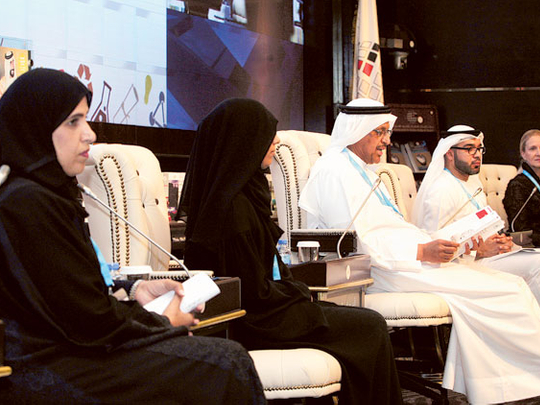
Abu Dhabi: The number of Emirati students pursuing degrees in education is still on the decline, despite authorities’ efforts to attract more young minds to the teaching profession.
In addition, there are hardly any males graduating as teachers, even though the country’s culture creates a need for male educators, officials said in the capital today (September 23).
“Unfortunately, no comprehensive study has been yet conducted to determine why Emirati youth are averse to the teaching profession. Previous research projects have pointed to low salaries, long working hours and poor perceptions, but there still needs to be an overall look into all of these factors,” said Mahra Al Mutaiwe’e, director of the UAE’s Unesco-affiliated Regional Centre of Education Planning.
Mahra was speaking at the fifth annual education conference organised by the Emirates Centre for Strategic Studies and Research. The two-day forum, which kicked off today (September 23) in Abu Dhabi, saw educators and officials discuss trends and challenges in the field.
Four federal universities in the UAE, including the UAE University (UAEU) and Emirates College for Advanced Education (ECAE), offer degrees in education. While enrolment for these Emirati-specific programmes is falling in general, Mahra said that the lack of male applicants is alarming.
“Enrolment at the UAEU has dropped from 781 in 2010 to 548 in 2014. What is worse is that no male students have registered for the degree over the last seven years,” she told Gulf News.
At ECAE, only six of 147 education graduates were male in 2012. And although a total of 114 students graduated in 2013 and 2014, none were female.
“Internationally, the number of men who pursue education as a field of study is always lower compared to the number of women. But in the UAE, our culture means that we have an acute need for male teachers for young boys,” Mahra said.
Dr Amal Al Qubaisi, director-general of the Abu Dhabi Education Council, stressed that teaching must be a means of giving back to one’s nation.
“Teachers are the most important innovators in any society, and the profession must be viewed as national service. And even though the UAE offers career opportunities in a multitude of fields, we must ensure that Emirati youth develop a passion for this profession as well,” Dr Amal said.
She added that there is an opportunity to employ more Emirati teachers to teach the subjects mandated by the UAE Ministry of Education, namely, Arabic, Islamic and Social Studies.
Attendees at the conference also called for more qualified teachers to be recruited and retained.
“The teacher licensing standards that are expected to be introduced by the UAE Ministry of Education next year will play a great role in setting and maintaining education quality standards,” Mahra said.
At the same time, she urged school leaders to offer continuous training opportunities for staff, and work to keep qualified personnel.











